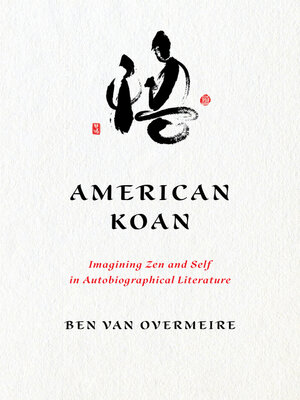American Koan
ebook ∣ Imagining Zen and Self in Autobiographical Literature · Studies in Religion and Culture
By Ben Van Overmeire

Sign up to save your library
With an OverDrive account, you can save your favorite libraries for at-a-glance information about availability. Find out more about OverDrive accounts.
Find this title in Libby, the library reading app by OverDrive.



Search for a digital library with this title
Title found at these libraries:
| Library Name | Distance |
|---|---|
| Loading... |
How American Buddhists use Zen riddles to imagine who they are
The koan is one of the most recognizable East-Asian spiritual exercises—a thought experiment in the form of a riddle or puzzle that Zen Buddhists employ to become enlightened. Well-known examples include the question "What is the sound of one hand clapping?," "Does a dog have Buddha-nature?," and the injunction "If you meet the Buddha on the road, kill him."
In American Koan, Ben Van Overmeire examines the literary function of these ancient dialogues in autobiographies of modern Western writers such as Natalie Goldberg, Peter Matthiessen, Philip Kapleau, Ruth Ozeki, and others. Through his attentive analyses of these authors, Van Overmeire unveils the rich world of American Zen literature and delves into the meaning of success and failure in Zen; how women find a place in this patriarchal tradition; how to combine Zen insight with compassion; and the illusory nature of linear time. Critical yet empathetic, this is a scintillating study of how Americans become Buddhas.
The koan is one of the most recognizable East-Asian spiritual exercises—a thought experiment in the form of a riddle or puzzle that Zen Buddhists employ to become enlightened. Well-known examples include the question "What is the sound of one hand clapping?," "Does a dog have Buddha-nature?," and the injunction "If you meet the Buddha on the road, kill him."
In American Koan, Ben Van Overmeire examines the literary function of these ancient dialogues in autobiographies of modern Western writers such as Natalie Goldberg, Peter Matthiessen, Philip Kapleau, Ruth Ozeki, and others. Through his attentive analyses of these authors, Van Overmeire unveils the rich world of American Zen literature and delves into the meaning of success and failure in Zen; how women find a place in this patriarchal tradition; how to combine Zen insight with compassion; and the illusory nature of linear time. Critical yet empathetic, this is a scintillating study of how Americans become Buddhas.







